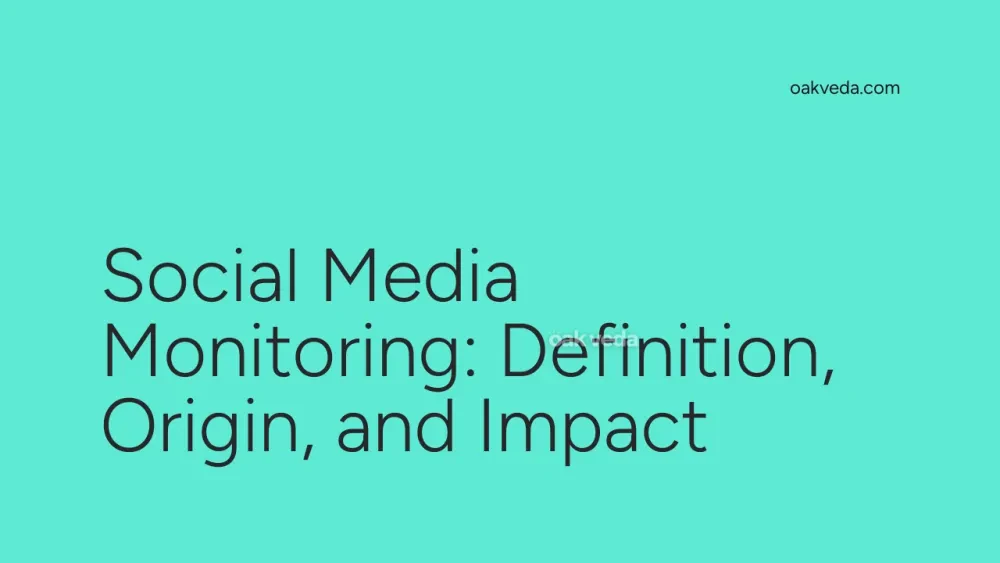
What is Social Media Monitoring?
Social media monitoring is the process of tracking, analyzing, and responding to conversations and mentions across various social media platforms. It involves using specialized tools to collect data about a brand, product, or industry from social networks, blogs, forums, and news sites. This practice allows businesses to gain valuable insights into their audience, competitors, and overall market trends.
Origin and Development of Social Media Monitoring
The concept of social media monitoring emerged alongside the rise of social media platforms in the early 2000s. As businesses recognized the growing importance of online conversations, they began seeking ways to track and analyze these discussions. Early methods involved manual searches and basic keyword tracking.
As social media usage exploded, more sophisticated tools and technologies were developed to handle the increasing volume and complexity of data. Today, social media monitoring has evolved into a critical component of digital marketing strategies, incorporating advanced analytics, artificial intelligence, and machine learning to provide real-time insights and actionable data.
How Social Media Monitoring Works
-
Data Collection: Monitoring tools crawl social media platforms, websites, and online forums to gather mentions of specified keywords, hashtags, or brand names.
-
Data Processing: The collected information is then processed and categorized based on various factors such as sentiment, relevance, and source.
-
Analysis: Advanced algorithms analyze the data to identify trends, patterns, and insights.
-
Reporting: The analyzed data is presented in user-friendly dashboards or reports, often in real-time.
-
Action: Based on the insights gained, businesses can take appropriate actions, such as responding to customer inquiries, addressing negative feedback, or adjusting marketing strategies.
Types of Social Media Monitoring
- Brand Monitoring: Tracking mentions and sentiment around a specific brand or product.
- Competitor Monitoring: Analyzing competitors' social media presence and strategies.
- Industry Monitoring: Keeping track of trends and discussions within a particular industry or market.
- Campaign Monitoring: Measuring the performance and impact of specific marketing campaigns.
- Influencer Monitoring: Identifying and tracking influential figures within a given niche or industry.
Popular Examples of Social Media Monitoring Tools
- Hootsuite: Offers comprehensive social media management and monitoring features.
- Sprout Social: Provides in-depth analytics and reporting capabilities.
- Brandwatch: Specializes in consumer intelligence and social media listening.
- Mention: Focuses on real-time monitoring and alerts across various platforms.
- Talkwalker: Offers advanced AI-powered social listening and analytics.
Impact of Social Media Monitoring on Social Media Culture
Social media monitoring has significantly influenced how brands interact with their audience and shape their online presence. It has led to:
- Increased Transparency: Brands are more accountable for their actions and communications.
- Improved Customer Service: Companies can quickly identify and address customer concerns.
- Data-Driven Decision Making: Marketing strategies are increasingly based on real-time social media insights.
- Personalized Content: Brands can tailor their content to better resonate with their audience.
- Crisis Management: Companies can detect and respond to potential PR crises more effectively.
Controversies Surrounding Social Media Monitoring
While social media monitoring offers numerous benefits, it has also raised concerns about privacy and data ethics. Critics argue that extensive monitoring can lead to:
- Invasion of personal privacy
- Misuse of personal data for targeted advertising
- Potential manipulation of public opinion
- Over-reliance on quantitative data at the expense of qualitative insights
How Brands and Influencers Use Social Media Monitoring
Brands and influencers leverage social media monitoring to:
- Measure Brand Sentiment: Understand how people perceive their brand or personal image.
- Identify Trends: Stay ahead of emerging topics and conversations in their industry.
- Engage with Audience: Respond promptly to mentions, comments, and direct messages.
- Manage Reputation: Address negative feedback and highlight positive experiences.
- Discover Collaboration Opportunities: Find potential partners or sponsorship deals.
- Track Campaign Performance: Measure the success of marketing initiatives and adjust strategies accordingly.
Future Trends in Social Media Monitoring
As technology continues to evolve, social media monitoring is likely to see advancements in:
- AI and Machine Learning: More sophisticated analysis of unstructured data and predictive insights.
- Visual Recognition: Improved ability to monitor and analyze images and videos.
- Voice and Audio Monitoring: As voice-based social platforms grow, monitoring tools will adapt to track audio content.
- Integration with Other Marketing Tools: Seamless connection with CRM systems and other marketing technologies.
- Ethical AI: Development of monitoring practices that balance insights with user privacy concerns.
FAQs about Social Media Monitoring
-
Is social media monitoring the same as social listening? While often used interchangeably, social media monitoring typically focuses on tracking specific mentions and metrics, while social listening involves a broader analysis of conversations and trends.
-
How often should businesses conduct social media monitoring? Ideally, social media monitoring should be an ongoing, real-time process to catch and respond to mentions promptly.
-
Can social media monitoring help with SEO? Yes, by identifying trending topics and keywords, social media monitoring can inform SEO strategies and content creation.
-
Is it legal to monitor social media conversations? Generally, monitoring publicly available information is legal. However, businesses should be aware of privacy laws and platform-specific terms of service.
-
How can small businesses afford social media monitoring? Many tools offer affordable plans for small businesses, and some even provide free versions with basic features.
In conclusion, social media monitoring has become an indispensable tool for businesses navigating the digital landscape. By providing valuable insights into customer sentiment, industry trends, and brand perception, it enables companies to make data-driven decisions and maintain a competitive edge in the fast-paced world of social media.
You may be interested in:
- Sksksk: Definition, Origin, and Impact on Social Media
- Stock Photos: Definition, Origin, and Impact on Social Media
- Marketing Funnel: Definition, Origin, and Impact
- Access Group: Definition, Origin, and Impact on Social Media
- Creator Economy: Definition, Origin, and Impact
- Fire: Definition, Origin, and Impact in Social Media

